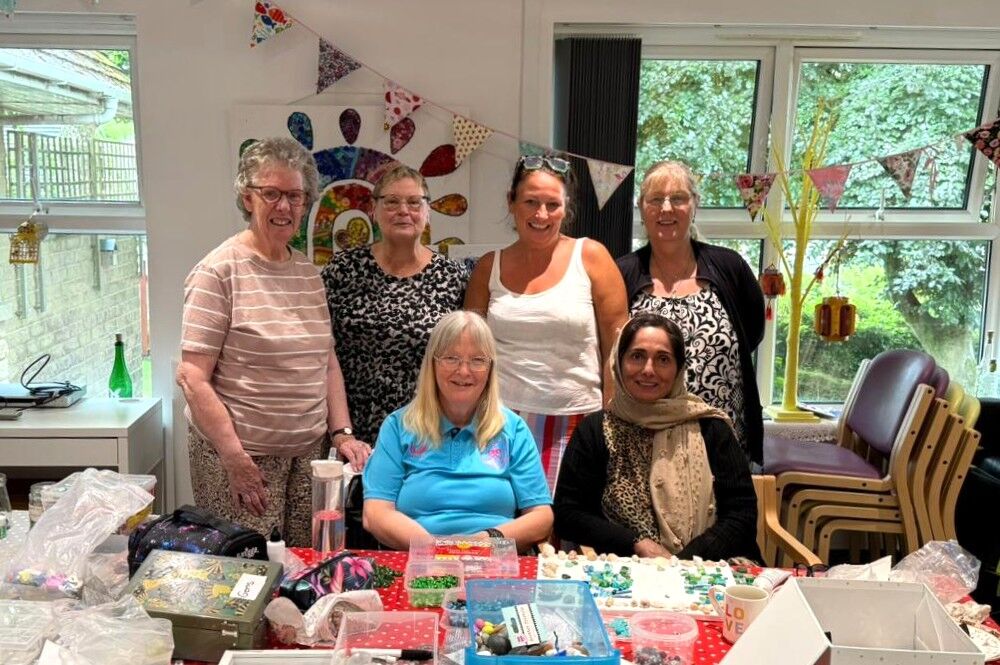
At Pendleside Hospice, we’re always looking for new ways to support our patients and service users, along with their carers and families.
Our Health, Wellbeing and Rehabilitation (HWR) team have recently introduced a brand-new weekly creative therapy group, a creative addition that is already making a big impact.
Each session lasts between two and three hours and runs over a period of nine to twelve weeks. The group is open to anyone already receiving support from Pendleside, whether through our HWR services, carer support, or bereavement counselling. The sessions are thoughtfully designed to welcome people who have a creative flair, wish to build connections, or want to learn something new.
Our aim is to create a space where people feel safe, supported and inspired. We want to offer something meaningful that brings joy, encourages connection and provides a sense of purpose during people’s visits.
This new initiative was made possible thanks to careful planning and reallocation of time and funding within the HWR team. We’ve taken an innovative approach to making the most of our resources, giving us the flexibility to trial new services that enhance the wellbeing of our service users in creative and meaningful ways.
We launched the first creative therapy group in May, led by a familiar face here at Pendleside, Lynda Laird. Lynda has worked with us for many years as a Rehabilitation Assistant on bank, and she was the perfect person to lead this new initiative. Prior to joining Pendleside, Lynda had embarked on nurse training, and her combination of healthcare experience and artistic passion made her a natural fit for the role.
Lynda brought compassion, creativity and warmth to every session, helping to lay the foundation for a truly special experience. Reflecting on the first group, Lynda shared, “I feel deeply moved by the journey we’ve shared. What began as a quiet, sometimes tentative group gradually grew into a confident, expressive and connected community. Teaching this class has reminded me of the quiet strength people hold, and how art can help bring it to the surface.”
“At first, many of the students were hesitant, not just about making art, but about allowing themselves to be seen.” Lynda added. “There was uncertainty in their mark-making, and sometimes even in their willingness to take up space. But week by week, something began to shift. Through creative exploration and a space that encouraged emotional safety and honesty, they started to take risks and engage more freely. What’s stayed with me the most is the sense of pride I saw emerging in each participant, not just pride in their artwork, but pride in their progress.”
The group explored a wide range of creative activities including painting, sea glass art and print making. Each week offered a different theme and medium, designed to encourage gentle self-expression and reflection.
The sessions have not only been creative, but also incredibly connecting. We’ve seen people form new friendships and create something meaningful to take home and treasure.
Julia O’Neill, Health, Wellbeing and Rehabilitation Manager, helped shape and guide the development of the programme and has been a key driver of its success. Julia, who is also good friends with Lynda, shared her thoughts on why creative therapy was the perfect fit.
“We recognised the need for a variety of activities to engage our service users,” Julia explained. “Whether someone is naturally creative or simply inquisitive, there’s a place for them. The activities promote conversation, reflection, and emotional expression. Lynda started off the sessions in the most perfect way. Her sessions always flowed so organically. Over time, she built up some wonderful relationships within the group, and by the final session, everyone was enjoying tea and cake together. What people create often becomes a lasting keepsake for families and we’ve had some phenomenal feedback from participants, with many describing the sessions as relaxing, uplifting, and even life-affirming.”
Following the success of the pilot block, we’re delighted to now be launching our second round of creative therapy sessions. This time, we’ll be joined by Aysha Saddiqa who will be introducing participants to the calming world of watercolour painting.
This growing initiative is a reminder that support comes in many forms. Creative therapy helps people express what words can’t always capture.
We are also reaching out to local artists and creatives who may be interested in supporting the sessions in future. Whether your passion is painting, wood carving, textiles, ceramics or something else entirely, we’d love to hear from you. If you feel you could contribute to this programme in a meaningful and sensitive way, please contact Diane Herbert on 01282 440 140.
